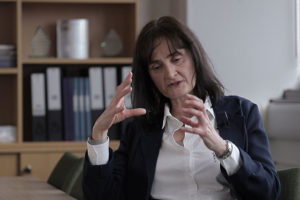Karl Friston: “The hallmark of a good scientist is...
Neuroscientist Karl Friston on the development of the free energy principle, what remains unknown about the br...
One interesting question that I investigate a lot these days is where our musical abilities come from. So is everyone born with the same musical abilities and do they develop through training or are there individual differences between people and their ability to make music, perceive music, process music?
The first musical ability tests are a hundred years old now, so Carl Seashore published a musical ability test in 1919, so it’s exactly 100 years, and since then many more tests of musical abilities have been published in the US but also over here in Europe. The purpose of this test at the beginning was to mainly to select able students so they could receive musical tuition and musical training especially in times where paying a music teacher was expensive and there wasn’t that much formal music tuition, you would only want to select the ones who would benefit most from music instruction. I think these days at least in the Western countries that isn’t an issue anymore and at least in middle-class families putting your child in touch with music and musical instrument is very much part of the culture, many schools offer free music lessons of free music taster lessons.
So this purpose of selecting individual children is not as prevalent as it was back then. Nonetheless, we do have these musical ability tests and musical skills tests and there are a couple of questions that arise from these. For example, is there one musical ability and then from this general musical ability that there would be subfacets like melodic processing, rhythmic processing, harmonic processing and are they all related to this general capacity? Or are they very independent? For example, could you be a really a rhythmic person but you don’t have a very good memory for melodies? Or could you be someone who’s very good at harmony but you’ve got a problem with rhythm?
That’s one question that hasn’t been answered yet. It’s very similar to questions that are asked in general intelligence research where there is the question, is there one g factor, one factor of general intelligence or are there unrelated facets, unrelated abilities that don’t belong with each other? And the same you could ask for music. I think that is still an unsolved question even though people have answered that question, so for example, Seashore, the pioneer of musical abilities testing, said that they’re all unrelated talents: you can be good at rhythm but that doesn’t mean that you are good at harmony or fine pitch discrimination. Others like Wing have said: no, there is one musical ability factor and you’re either good at music or you’re aren’t. That explains why you’re good at almost everything.
In recent years the focus of testing has shifted from children to adults and many tests have been published in the last 15 years, new tests on musical abilities, and we know a lot more about how musical abilities correlate with, say, general intelligence, working memory, sensory processing, but also other traits like personality or autism. The range of tests that we have at our disposal is really helpful to drive this development and see where music or musical ability sits among all the other human abilities that we have. That’s an interesting question – whether music is related to other traits like intelligence, personality, or not.
Obviously there is this claim in the literature that music and intelligence, for example, are related, or that music makes you more social person because you often make music together with other people and it’s a social activity. It’s also an emotional activity unlike chess, for example, which is also linked to the high cognitive processing. Chess doesn’t have any emotional component. So music is unique in that sense that it’s cognitive, it’s emotional and it’s a motor activity as well. So it engages a lot of what we are and what we can do as humans.
One question is how musical abilities develop, so how much is due to training and how much is due to individual differences. For example, could there be, say, a hidden Mozart, a person who’s got a great musical talent but hasn’t been exposed to music instruction yet, has never touched an instrument? Could there be such a great musical talent without that person him or herself knowing that they possess that great musical talent? Or do you only develop musical ability once you start engaging with music? Where does that come from, how much is genetics, how much is the environment and how much is training in how skills develop? This is a question that’s very much debated at the moment, it’s kind of the nature-nurture question that is being debated in other fields of psychology as well. But music is a very good domain to study that because there’s lots of people have exposure to music, have the chance to start learning a musical instrument, are exposed to musical training, and you can actually follow how they develop in their musical abilities over time.
This is a research project that we are pursuing at the moment where we are interested in how musical abilities develop over the adolescent period, in that time between 10 years and 18 years, roughly secondary school years. Most people go on a specific trajectory with music, some people really take up music, intensify what they do with music, invest more time to playing music, going to a concert, music becomes their identity, they start learning music and they get better at music and it becomes part of who they are, music is very important to them. Then other people don’t have that, they might have had the same chance, so they have been exposed to use it, they have the opportunity to learn an instrument, they might have a similar family background and yet they don’t take up music for whatever reason, or they start an instrument and give it up later.
The big research project that we’re running at the moment is exactly about this question. We’re following children when they enter secondary school, we assess them on a battery of about 20 tests, so there are some musical tests, there’s a general intelligence test, there are other general cognitive ability tests, but also personality attitudes towards learning and their own abilities. And we come back into the same schools every year and assess the same people, the same children on the same tests to see how they grow from year to year and to see who goes on a trajectory with music that is really taking off and who else might not go on these trajectories. Would we be able to predict, for example, with the data that we collect when they’re about 10 or 11 years old, would be able to predict that this person is someone who by the age of 15 would be really good at that music if they have the opportunity? Or could we predict that this other person might have the opportunity to start with music but would give up because they have the wrong personality or they haven’t got the working memory capacity to learn music really efficiently? Is that something that we could do?
That’s a very open question and we’re really keen to find out. The project is taking place in the UK and we’ve got several schools that we’ve been following over recent years. Recently we started this project in Germany as well with seven schools this year. It would be interesting also to see whether there’s any educational difference or any cultural differences between these two countries or whether the results that we find would be the same regardless of country and schooling system. If that was the case then it would tell us that the results are really robust and don’t depend on individual quirks of a schooling system. We’re very keen to expand this line of research with other European countries and countries outside Europe as well.
0So that’s a big quest at the moment. Obviously it’s a longitude study, it takes a long time to get the data and results in, but it would give us a good handle on understanding the cause of mechanisms of who develops very musical and who doesn’t and the dimension of time gives us a handle on causality. So most studies that have been done in that area before do a cross-sectional shot at the data which means they test all children at the same time, they don’t follow up. Then, if you find a connection between intelligence, say, and musicality you don’t know where it comes from. Is that the smarter kids that take up music or was it the musical kids that become smarter because of their musical training? So you don’t know which is which, but if you have time you can actually compare much more closely. So you can look at children who don’t have any music instruction yet and the same intelligence. One of them for whatever reason starts musical training and then you follow their trajectory of intelligence development and see whether there’s any effect of musical training in the ones who take up music and compare that to statistically very similar children who don’t take up music. That’s a great handle to get at causal relationships even though we are not intervening, so we don’t prescribe people: you have to take music and you can’t take music – because that would be unethical. So this is one of these questions where you have to take the data as you get it in the real world and if you have enough of it you might be able to make valid causal predictions.

Neuroscientist Karl Friston on the development of the free energy principle, what remains unknown about the br...

Molecular Biologist Greg Towers on HIV discovery in San Francisco, antiviral drug therapy and current areas of...

Physicist Michele Dougherty on Cassini and Voyager missions and the possibility of life on Enceladus